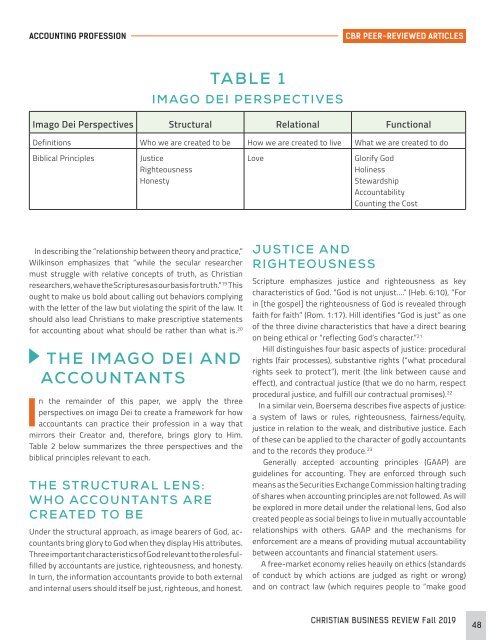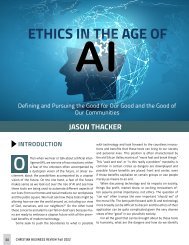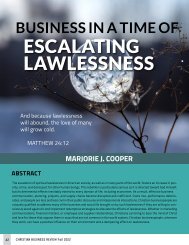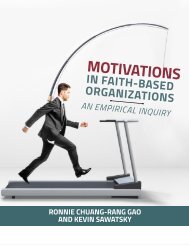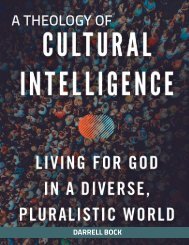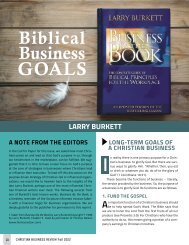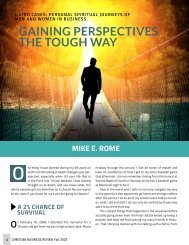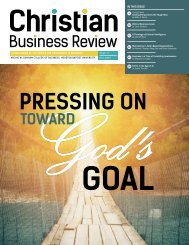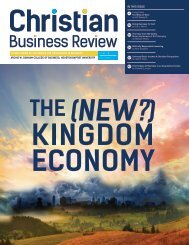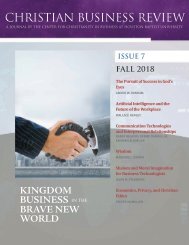Christian Business Review 2019: Workplace Practices That Glorify God (Issue 8)
You also want an ePaper? Increase the reach of your titles
YUMPU automatically turns print PDFs into web optimized ePapers that Google loves.
ACCOUNTING PROFESSION<br />
CBR PEER-REVIEWED ARTICLES<br />
TABLE 1<br />
IMAGO DEI PERSPECTIVES<br />
Imago Dei Perspectives Structural Relational Functional<br />
Definitions Who we are created to be How we are created to live What we are created to do<br />
Biblical Principles<br />
Justice<br />
Righteousness<br />
Honesty<br />
Love<br />
<strong>Glorify</strong> <strong>God</strong><br />
Holiness<br />
Stewardship<br />
Accountability<br />
Counting the Cost<br />
In describing the “relationship between theory and practice,”<br />
Wilkinson emphasizes that “while the secular researcher<br />
must struggle with relative concepts of truth, as <strong>Christian</strong><br />
researchers, we have the Scriptures as our basis for truth.” 19 This<br />
ought to make us bold about calling out behaviors complying<br />
with the letter of the law but violating the spirit of the law. It<br />
should also lead <strong>Christian</strong>s to make prescriptive statements<br />
for accounting about what should be rather than what is. 20<br />
THE IMAGO DEI AND<br />
ACCOUNTANTS<br />
In the remainder of this paper, we apply the three<br />
perspectives on imago Dei to create a framework for how<br />
accountants can practice their profession in a way that<br />
mirrors their Creator and, therefore, brings glory to Him.<br />
Table 2 below summarizes the three perspectives and the<br />
biblical principles relevant to each.<br />
THE STRUCTURAL LENS:<br />
WHO ACCOUNTANTS ARE<br />
CREATED TO BE<br />
Under the structural approach, as image bearers of <strong>God</strong>, accountants<br />
bring glory to <strong>God</strong> when they display His attributes.<br />
Three important characteristics of <strong>God</strong> relevant to the roles fulfilled<br />
by accountants are justice, righteousness, and honesty.<br />
In turn, the information accountants provide to both external<br />
and internal users should itself be just, righteous, and honest.<br />
JUSTICE AND<br />
RIGHTEOUSNESS<br />
Scripture emphasizes justice and righteousness as key<br />
characteristics of <strong>God</strong>. “<strong>God</strong> is not unjust….” (Heb. 6:10), “For<br />
in [the gospel] the righteousness of <strong>God</strong> is revealed through<br />
faith for faith” (Rom. 1:17). Hill identifies “<strong>God</strong> is just” as one<br />
of the three divine characteristics that have a direct bearing<br />
on being ethical or “reflecting <strong>God</strong>’s character.” 21<br />
Hill distinguishes four basic aspects of justice: procedural<br />
rights (fair processes), substantive rights (“what procedural<br />
rights seek to protect”), merit (the link between cause and<br />
effect), and contractual justice (that we do no harm, respect<br />
procedural justice, and fulfill our contractual promises). 22<br />
In a similar vein, Boersema describes five aspects of justice:<br />
a system of laws or rules, righteousness, fairness/equity,<br />
justice in relation to the weak, and distributive justice. Each<br />
of these can be applied to the character of godly accountants<br />
and to the records they produce. 23<br />
Generally accepted accounting principles (GAAP) are<br />
guidelines for accounting. They are enforced through such<br />
means as the Securities Exchange Commission halting trading<br />
of shares when accounting principles are not followed. As will<br />
be explored in more detail under the relational lens, <strong>God</strong> also<br />
created people as social beings to live in mutually accountable<br />
relationships with others. GAAP and the mechanisms for<br />
enforcement are a means of providing mutual accountability<br />
between accountants and financial statement users.<br />
A free-market economy relies heavily on ethics (standards<br />
of conduct by which actions are judged as right or wrong)<br />
and on contract law (which requires people to “make good<br />
CHRISTIAN BUSINESS REVIEW Fall <strong>2019</strong><br />
48 2


